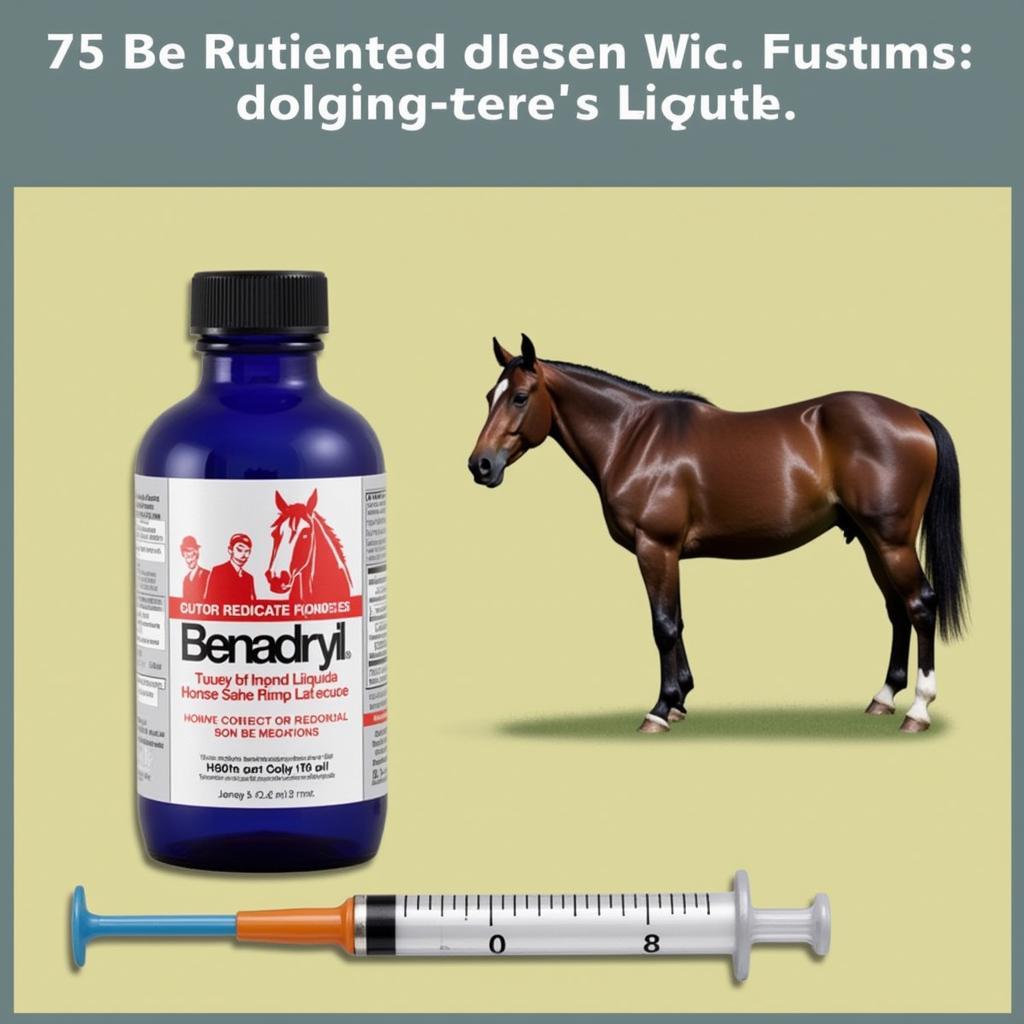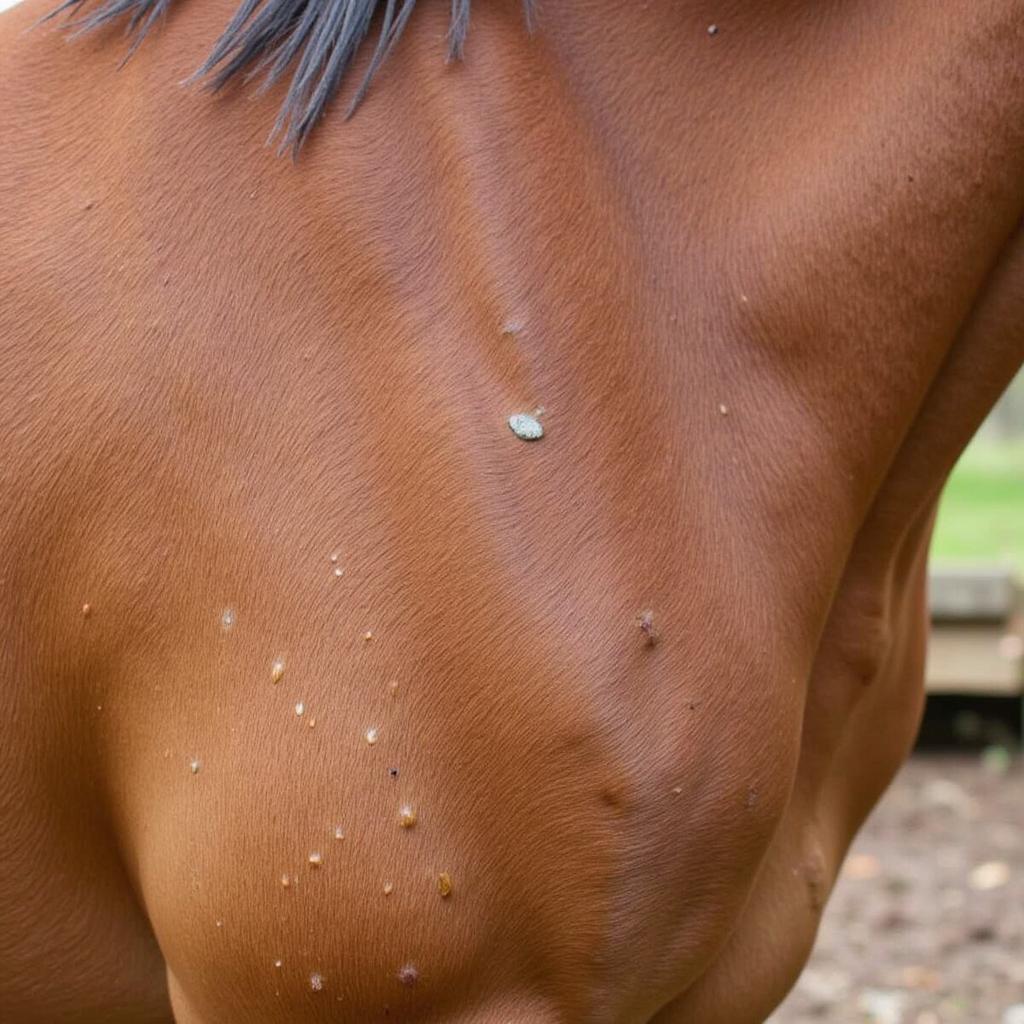Understanding the correct Benadryl Dose For Horses is crucial for their well-being. This guide provides in-depth information on administering benadryl safely and effectively to your equine companion. We’ll cover dosage guidelines, potential side effects, and when to consult a veterinarian.
Understanding Benadryl and Its Uses in Horses
Benadryl, also known as diphenhydramine, is an antihistamine commonly used in both humans and animals to alleviate allergic reactions. In horses, it’s often administered to manage mild allergic reactions, insect bites, hives, and itching. It can also help reduce swelling and inflammation associated with these conditions. Benadryl works by blocking the effects of histamine, a chemical released by the body during an allergic reaction. However, it’s crucial to remember that benadryl is not a cure-all and should not be used to mask underlying health issues.
 Benadryl bottle, syringe, and horse in background
Benadryl bottle, syringe, and horse in background
Determining the Right Benadryl Dose for Horses
The recommended benadryl dose for horses typically ranges from 25mg to 50mg per 100 pounds of body weight, administered orally every 4 to 6 hours. For instance, a 1000-pound horse might receive between 250mg and 500mg of benadryl. It’s essential to consult your veterinarian to determine the appropriate dosage for your horse’s specific needs and condition. They can consider factors such as age, weight, and the severity of the allergic reaction. Administering an incorrect benadryl dose can lead to adverse effects, so always follow your veterinarian’s instructions carefully.
Different Forms of Benadryl for Horses
Benadryl is available in various forms, including tablets, capsules, liquid solutions, and injectable formulations. Oral administration is generally preferred for mild allergic reactions, while injectable benadryl is reserved for more severe cases and typically administered by a veterinarian. The specific form of benadryl and the route of administration will influence the dosage and frequency of administration.
Potential Side Effects of Benadryl in Horses
While generally safe, benadryl can occasionally cause side effects in horses. These may include drowsiness, dry mouth, and decreased appetite. In rare cases, more serious side effects like incoordination, seizures, and even death have been reported. Monitoring your horse for any unusual behavior after administering benadryl is essential. If you notice any adverse effects, contact your veterinarian immediately.
When to Consult a Veterinarian
If your horse’s allergic reaction is severe or doesn’t respond to benadryl, seek immediate veterinary attention. Similarly, if your horse experiences any unusual or concerning side effects after taking benadryl, contact your veterinarian without delay. Never attempt to diagnose or treat your horse without professional guidance.
 Close-up of a horse's skin with hives
Close-up of a horse's skin with hives
Conclusion: Safe and Effective Benadryl Use for Horses
Administering the correct benadryl dose for horses is vital for managing allergic reactions and ensuring their well-being. Always consult your veterinarian to determine the appropriate dosage and monitor your horse closely for any potential side effects. By following these guidelines, you can help alleviate your horse’s discomfort and ensure they receive the appropriate care.
FAQ
- Can I give my horse human benadryl? Yes, but always consult a veterinarian for proper dosage.
- How often can I give my horse benadryl? Typically, every 4-6 hours as directed by your veterinarian.
- What are the signs of an allergic reaction in a horse? Hives, itching, swelling, and difficulty breathing.
- Can foals take benadryl? Consult your veterinarian for specific dosage instructions for foals.
- What should I do if my horse overdoses on benadryl? Contact your veterinarian immediately.
- Are there any alternative treatments for allergic reactions in horses? Your veterinarian can discuss alternative options.
- How is injectable benadryl administered to horses? Typically by a veterinarian.
For further information on equine health and care, explore other articles on Justus Horses USA. When you need assistance, contact us at Phone: 0772127271, Email: [email protected], or visit us at QGM2+WX2, Vị Trung, Vị Thuỷ, Hậu Giang, Việt Nam. We have a 24/7 customer service team.